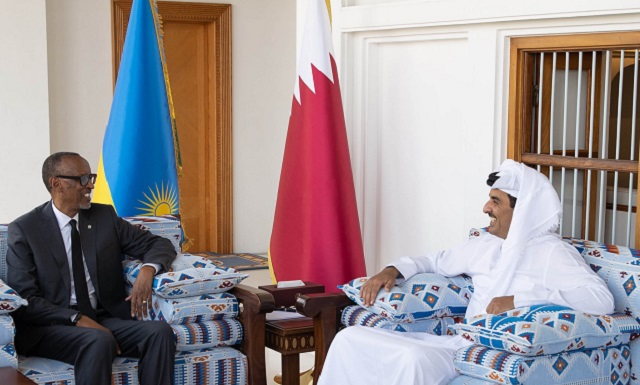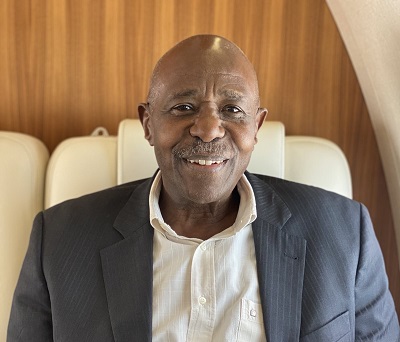
How the Gulf nation navigated Rwanda-US tension
Kampala, Uganda | IAN KATUSIIME | On March 30, Paul Rusesabagina, an erstwhile critic of Rwandan President Paul Kagame, arrived in the U.S. from Qatar to begin a life of “quiet reflection” after over 900 days in detention in Rwanda.
Following months of negotiations between Rwanda and the U.S. mediated by Qatar, Rusesabagina was freed from Nyarugenge prison in Rwanda on March 24. After his release, the famous political prisoner boarded a flight to Qatar where he spent a few days before connecting to the U.S. where he is a permanent resident.
Rusesabagina shot to global fame after the 2004 film Hotel Rwanda portrayed him as a hero for sheltering more than a thousand people during the Rwandan genocide. The genocide in 1994 claimed the lives of an estimated 800,000 Tustsi and moderate Hutu.
Reports said Rusesabagina stayed at the residence of the Qatari ambassador to Rwanda after his release– signaling the outsize role played by Qatar, a close ally of Rwanda, in the release of a man who had become a thorn in Rwanda-US relations. He was lured to Rwanda and arrested after boarding a private jet from Dubai in 2020.
After a trial denounced by critics as a sham, Rusesabagina was sentenced to 25 years in jail in 2021 on eight terrorism charges.
While speaking virtually at the Global Security Forum held in Doha, the capital of Qatar, in early February, President Kagame sounded upbeat about the release of Rusesabagina when asked about it by a moderator. “There’s work going on about it. We are not people who want to get stuck in one place and not make any movement forward for whatever reason,” he told the audience from his office in Kigali.
Kagame enjoys close ties to the Emir of Qatar; Sheikh Tamim ibn Hamad Al Thani, and is a regular visitor to the country. He was in Qatar on March 21 for a working visit with Sheikh Tamim–three days before Rusesabagina’s release where the ultimate discussions on freeing the Hotel Rwanda hero were had.
Kagame also attended the World Cup opening ceremony in Qatar in December 2022. On the sidelines of the U.S. Africa Leaders Summit in Washington D.C. in the same month, Kagame said that no one would “bully” Rwanda into releasing Rusesabagina who is a Belgian citizen.
The U.S. had designated Rusesabagina as “wrongfully detained” raising the profile of his situation and leaving U.S-Rwanda relations on ice.
Rusesabagina fled Rwanda in 1996 for Belgium after he became a public critic of Kagame, then Rwandan vice president although he was known as the de facto ruler of the country.
Fast forward, Rusesabagina is now a free man after requesting for a presidential pardon in a letter to Kagame on October 14, 2022. Rusesabagina, 68, cited advanced age and ill health as the major reasons for his plea for clemency.
Qatar developed interest in the matter after Rusesabagina’s anguished letter. A spokesperson for the Ministry of Foreign Affairs, Dr. Majed bin Mohammed Al Ansari, in a press conference explained that Qatar “held many contacts to bridge the views” between Rwanda and the U.S.
Qatar and the Rwandan government then kicked off negotiations involving the highest echelons of American power- the White House. Al Ansari expressed his gratitude to the Rwandan government and the U.S. for their cooperation in the talks.
He also pointed out that Qatar is an “essential partner” for development efforts in Rwanda and added that the positive relations and great trust between the leadership of the two countries made the release possible. Al Ansari also cited the strategic relations Qatar has with the U.S.
Qatar has also attempted to mediate the Rwanda-DRC row but the latter rejected the efforts saying the Gulf nation is too close to Rwanda to act as a mediator.

Rusesabagina letter
Rusesabagina made deep concessions and renounced any political ambitions in his letter to the Rwandan President. “If I am granted a pardon and released, I understand fully that I will spend the remainder of my days in the United States in quiet reflection,” he wrote from Nyarugenge prison.
“I can assure you through this letter that I hold no personal or political ambitions otherwise. I will leave questions regarding Rwandan politics behind me.” Rusesabagina was one of the leaders of the Rwanda Movement for Democratic Change (MRCD), a group opposed to the ruling Rwanda Patriotic Front (RPF), whose chairman is Kagame.
“Moving forward, I know you will focus on securing a peaceful future for all Rwandans. I hope all Rwandans can find peaceful ways to overcome national disagreements and bring Rwandans together through the power of words,” he wrote.
Rusesabagina denounced violence and regretted not taking care to ensure his colleagues in the MRCD adhere to non-violent methods.
In 2024, Rwanda will be commemorating 30 years since the genocide happened while also gearing up for an election which Kagame is widely expected to win.
The breakthrough to free Rusesabagina came after Kagame’s most recent visit to Qatar in March. Pressure from the U.S., a close ally of Rwanda, is strongly believed to have played a part in the eventual path to negotiations.
“This is the result of a shared desire to reset US-Rwanda relationship,” tweeted Stephanie Nyombaire, Kagame’s press secretary.
U.S. Secretary of State Anthony Blinken visited Rwanda in August 2022 and held talks with Kagame and a press conference with Rwandan minister of foreign affairs Vincent Biruta. It was reported Blinken brought up the issue of Rusesabagina during the meeting. However mounting pressure from the Rusesabagina family also tipped the scales in his favour.
The family filed a $400 million lawsuit in the U.S. early last year over his alleged abduction and torture by the government in Kigali. Just over a month after the lawsuit was filed, Rusesabagina’s 25-year jail term was upheld by Rwanda’s Court of Appeal. Carine Kanimba, Rusesabagina’s daughter, waged a relentless social media campaign to free her father from the day he was arrested until he was released.
‘Commutation by presidential order’
Following the negotiations and approval by the Rwandan Cabinet, Rusesabagina’s sentence was commuted by presidential order according to a statement by the ministry of justice. The statement had a poignant reminder; “Under Rwandan law, commutation of sentence does not extinguish the underlying conviction,” it read. He was freed with nineteen others under collective commutation.
The statement stressed that if any individual benefitting from early release repeats offences of a similar nature, “the commutation can be revoked and the remainder of the prison sentence will be served, in accordance with the conditions specified in the Presidential Order.”
 The Independent Uganda: You get the Truth we Pay the Price
The Independent Uganda: You get the Truth we Pay the Price


